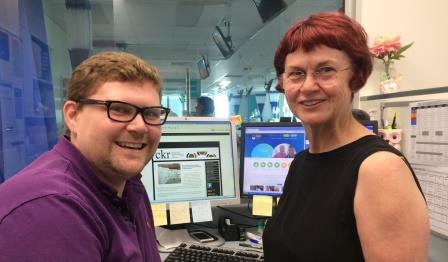Metro North researchers drive innovation

Dr Andrew Mallett, pictured with Director of Renal Medicine at RBWH, Dr Helen Healy, is one of two Metro North researchers awarded NHMRC grants to investigate screening processes and improved treatments for kidney disease.
Two Royal Brisbane and Women’s Hospital (RBWH) next generation researchers will investigate screening processes and improved treatments for kidney disease with grants awarded by the National Health and Medical Research Council (NHMRC).
Dr Andrew Mallett will be clinical lead on a five member team led by Professor Melissa Little researching the application of functional genomics to kidney disease, while Dr Andrew Kassianos will investigate how pathogenic dendritic cells cause injury in human kidney disease. The genetics study has received funding of $1.2 million over four years. Dr Kassianos will receive $370,983 for his research.
Director of Renal Medicine at RBWH Dr Helen Healy said it was unprecedented for RBWH renal researchers to be awarded two significant grants in the same NHMRC funding round.
“The RBWH is widely acknowledged as an emerging leader due to the quality of work being undertaken here,” Dr Healy said.
“The investigations being done by these two early career researchers have the potential to influence the future of health care as both are undertaking exciting work into the most common chronic illness in Australia,” Dr Healy said.
“One in eight people in our community will experience chronic kidney disease (CKD) in their lifetime. It is a health problem that carries immense social and economic implications for communities and the nation.
It is common; it is harmful, but it is treatable.
“Through this innovative research, there is the potential to slow the rate of CKD in the community, if not one day possibly cure it.”
Dr Healy said both Dr Mallett and Dr Kassianos are dedicated to delivering outcomes that will benefit patients, their families and society as a whole.
Through his research, Dr Mallett hopes to give patients and their families a more accurate diagnosis of disease and expand their understanding of the genetic causes of kidney disease in the up to 10-20% of adults and 30-50% of children with a genetic or inheritable form. The new knowledge will form a platform for different paradigms of managing these young people.
“This research is clinically oriented and focused upon finding the unknown amongst the unseen. After all, in the longer term we can’t begin to treat in a targeted or effective way what we don’t understand. In the near term it will assist patients to get correct diagnoses, access genetic counselling and unlock both their and our ability to understand those diagnoses,” Dr Mallett said.
Dr Kassianos said the cost of treating end stage kidney disease in Australia is more than $1 billion a year.
“Kidney disease is associated with an influx of inflammatory cells. However, current therapeutics fail to target this process due to our poor understanding of inflammatory immune cells in disease progression,” he said.
“This project will investigate the biology of immune cells in human kidney disease and inform more accurate diagnoses and improved treatments for patients.”
Dr Healy acknowledged the ongoing support of the RBWH Foundation and RBWH Private Practice Trust Fund, whose funding has helped nurture the burgeoning research culture at the RBWH.
A full list of grant recipients is available at https://www.nhmrc.gov.au
